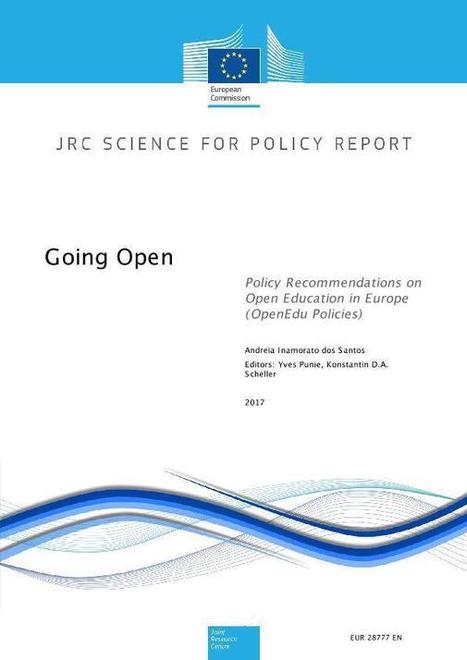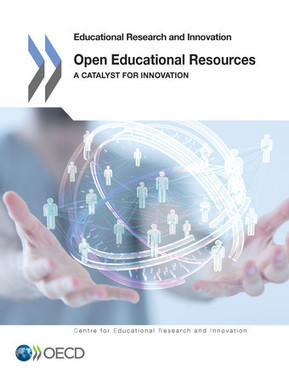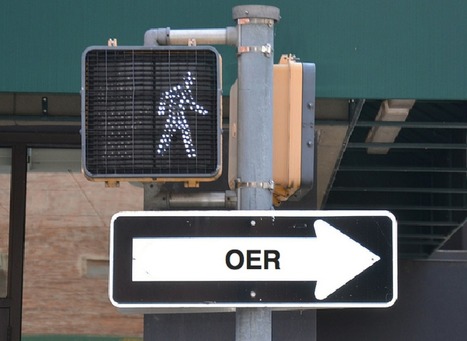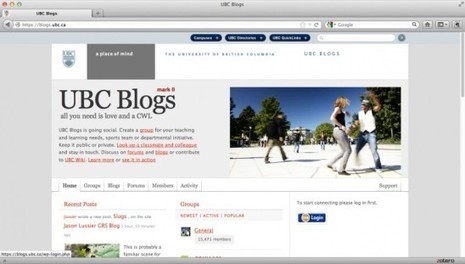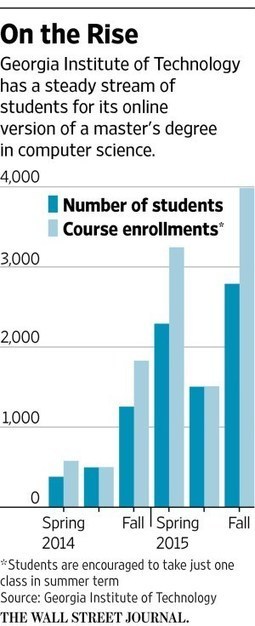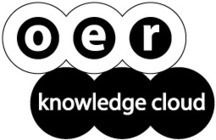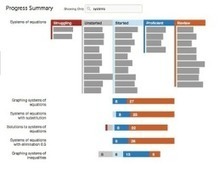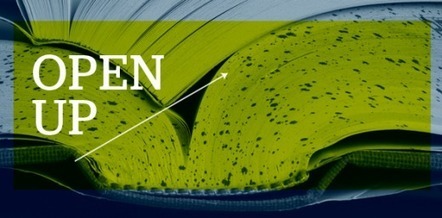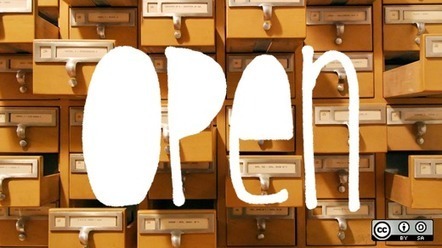 Your new post is loading...
 Your new post is loading...
Key Points - Open data can help researchers and policy makers understand the education landscape, can provide information for parents and children about education facilities and their performance, and can be used as an input into education: making a connection between open data and Open Educational Resources (OER).
- Attention must focus beyond the simple availability of education data to also question how the data is shaped, presented, and used. This should address the ways in which, without wider policy interventions, making data available about education performance may ultimately reinforce stigma and social divides.
- There has been relatively limited overlap between OER and Open Data communities, although since 2013, the Open Knowledge Education Working Group has sought to build connections between them. There are opportunities for future strengthening of these links, increasing the use of open data as a key educational resource, and supporting more applied civic education.
Open education is an increasingly important part of how educational institutions deliver their public mission and commit to increased quality and more effective education, and it is also a potential means of achieving social inclusion and equal opportunities. Open educational practices provide paths for educational institutions to be more accountable to society, they modernise education by embracing the use of digital technologies, and they also promote transparent strategies. Going open is a process for all involved: institutions, learners and society. It depends on creating both digital and non-digital opportunities to make education more collaborative, more transparent and more inclusive.
Data, research and country reviews on innovation including innovation in science and technology, research and knowledge management, public sector innovation and e-government., Education is the key to economic, social and environmental progress, and...
One school in Pennsylvania is using open-source tools wherever possible to keep students close to the code behind the machines they use. This stance is opposite to the very restrictive policies of many schools, but could allow students more freedom to explore what makes devices work.
Massive open online courses – MOOCs – offered by top universities have expanded worldwide over the last three years, gaining students globally for courses designed in the United States and elsewhere and disseminated globally on platforms like Coursera, edX and the British-based FutureLearn.
Their spread has the potential to disrupt the model of bricks-and-mortar universities each with their own courses – a theme much discussed in academia.
But a new type of MOOC – dubbed MOOC 2.0 – could even disrupt the way courses are devised, altering the top-down university designed curriculum and the professor-to-student course structure that is still part of the MOOC model.
O.K., so massive open online courses didn’t change the world. That doesn’t mean they’re failures. .... Following the “hype cycle” modelfor new technology products developed by the Gartner research group, MOOCs have fallen from their “peak of inflated expectations” in 2012 to the “trough of disillusionment.” There are several reasons for the disillusionment. First, the average student in a MOOC is not a Turkish villager with no other access to higher education but a young white American man with a bachelor’s degree and a full-time job.
Lu Xiao, a researcher in collaborative and social computing, carried out a study of academic perceptions of Wikipedia and open access publishing. Survey results showed that researchers’ lack of experiences with Wikipedia and/or open access journals negatively affected their perceptions of the open access publishing model. Compared to tenur...
Academics have been encouraged to make their research freely available, but their data also needs to be open to scrutiny
Reusing existing Open Educational Resources (OER) can save significant time and effort. The OPEN partners recommend TAACCCT grantees invest up-front time finding OER to reuse rather than starting development of new educational resources right away. A significant benefit of OER is that they provide source material to build your development efforts around. No need to invest development effort in creating something that already exists. OER come in a wide variety of types. Many educators are simply looking for individual media elements to use within their courses, such as photos, graphics, videos, and audio, that are openly licensed in a way that freely permits education use. The page below will help you find openly licensed media elements to use within your courses. To jump directly to what you are searching for use these links:
General Search
Photo/Image Search
Video Search
Audio/Music Search
"Learning Analytics is the measurement, collection, analysis and reporting of data about learners and their contexts, for purposes of understanding and optimizing learning and the environments in w...
Why are MOOCs innovative? They provide alternative ways for students to gain new knowledge according to a given curriculum. MOOCs can also enhance learners’ ability to think creatively to select and adapt a paradigm to solve the problem at hand. These are the main findings of a case study on the Discrete Optimization MOOC on Coursera.
Thousands of hours of historical footage showing major events, celebrities and simple day-to-day life from 1896 until 1976 has been uploaded to YouTube
This is an article on a project by the University of Mary Washington, Virginia, that enables all students to create their own academic web presence through the provision of a university-wide blogging platform. The article provides some good examples of student work done through this project, particularly in history.
|
In a recent UW-Madison event focused on building community in MOOCs, Al Filreis offered a keynote, “The Non-automated Humanities MOOC,” in which he remarked, “Don’t talk about MOOCs as courses. That’s a slippery slope to creating a thing that doesn’t hybridize but colonizes.” To see the MOOC as a course, as that which reinforces ossified hierarchical relationships in learning environments, is to carry forward a banking model of pedagogy that does nothing to empower students or teachers. As Sean says, “The openness the MOOC presages is one where agency trumps position, where a student can become a teacher, a teacher a student, and the whole endeavor of education becomes a collaboration.”
This post was written by Martin Weller.
One of the things we’ve noticed as a research team attending different conferences that deal with aspects of ‘Open Education’ is that people come into it from a wide range of backgrounds. It is also quite a broad term, with many different interpretations and perspectives. This can make it quite difficult for a new researcher to know where to start, or to come to common understanding when people have different starting points.
MOOCs have made us think. As one of the most fascinating developments in higher education in my lifetime, they are,in many ways, a pioneer of a more ‘open’ spirit in learning. I’d contend that MOOCs, for all their promises and faults, have been at their most effective in forcing a rethink in Higher Education.
Via Nik Peachey
Open access refers to the practice of making peer-reviewed scholarly research and literature freely available online to anyone interested in reading it.
Faculty aren't using OER—or they are, but just don’t know it, says a new industry report; leading to concerns about definition and copyright understanding. This data comes from a new Babson Survey Research report that aimed to determine whether or not faculty (who chief academic officers, and faculty themselves, say are the main adopters of classroom materials) are using OER.
The purpose of this paper is to compile and analyze the state-of-the-art in MOOC research that has been conducted in the past five years. A template analysis was used to map the conducted research on MOOCs into seven dimensions, namely concept, design, learning theories, case studies, business model, targets groups, and assessment. This classification schema aims at providing a comprehensive overview for readers who are interested in MOOCs to foster a common understanding of key concepts in this emerging field. The paper further suggests new challenges and opportunities for future work in the area of MOOCs that will support communication between researchers as they seek to address these challenges.
Are the barriers to adoption of free and open source software to be found within institutions, or are there issues with the available supply of software and services to the sectors?
More than just a popular producer of excellent tutorials, Khan Academy is also leveraging data to enable teachers to assess progress and focus on individual
How can open educational resources learn from the free and open software movement?
This presentation argues that a number of innovative technical developments, including OER and MOOCs but also microlearning and innovative forms of assessmen...
It is true that it's difficult to keep up with all the applications out there, so I've compiled a great list of the top 5 open source tools for libraries. There was a time when working in the library I found it very frustrating (as many librarians do) that there were so few options for software that actually did what I needed. In libraries we're so used to there being this vendor=software model. Where one vendor controls a product and while there might be other similar products, they too are controlled by a vendor.
|



 Your new post is loading...
Your new post is loading...


